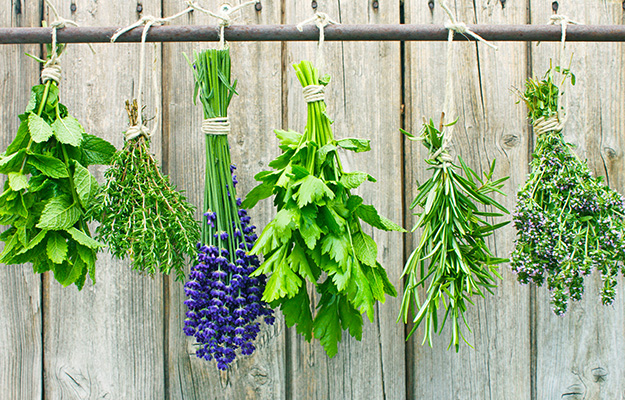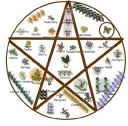I do not write spells or do spells or hexes or curses or rituals or any other type of magick for anyone so please do not email me asking me to do any of these. If you do your email will wind up in Spam and then deleted.

It was brought to my attention that we did not have page that dealt with herbs pregnant ladies should or should not handle during their pregnancy. I am sure this comes up quite a bit in magickal rituals and spells. I have compiled a list of herbs that should not be used by pregnant witches or digested. Of course, the baneful herbs we all know and know even if we are pregnant not to use them. I have heard some say, “it is ok to handle and use these herbs if you wear Playtex gloves.” I would highly advice against this. Your hands might be protected by you have the rest of your body that isn’t. These herbs can absorb through your clothing and get on your skin. Some of them are harmful to the fetus. My best advice, if you are pregnant leave these herbs alone.
Here is the list of herbs that you need to avoid, I hope you find it helpful.
Angelica – stimulates suppressed menstruation
Black Cohosh – uterine stimulant – mostly used during labor
Blue Cohosh – a stronger uterine stimulant
Borage oil – a uterine stimulant – use only during the last few days of pregnancy
Comfrey – can cause liver problems in mother and fetus – use only briefly, externally only, for treating sprains and strains –
Dong Quai – may stimulate bleeding
Elder – do not use during pregnancy or lactation
Fenugreek – uterine relaxant
Goldenseal – too powerful an antibiotic for the developing fetus, also should not be used if nursing
Henbane – highly toxic
Horsetail – too high in silica for the developing fetus
Licorice Root – can create water retention and/or elevated blood pressure
Motherwort – stimulates suppressed menstruation
Mugwort – can be a uterine stimulant
Nutmeg – can cause miscarriage in large doses
Pennyroyal Leaf – stimulates uterine contractions (NOTE: Pennyroyal essential oil should not be used by pregnant women at any time!) – do not handle if pregnant or nursing
Rue – strong expellant
Shepherd’s Purse – used only for hemorrhaging during/after childbirth
Uva Ursi – removes too much blood sugar during pregnancy and nursing
Yarrow – uterine stimulant
And there are more…
Aloe Vera – The leaves are strongly purgative and should not be taken internally.
Arbor vitae (Thuja occidentalis) – A uterine and menstrual stimulant that could damage the fetus.
Autumn crocus (Colichicum autumnale) – Can affect cell division and lead to birth defects.
Barberry (Berberis vulgaris) – Contains high levels of berberine, known to stimulate uterine contractions.
Basil oil – A uterine stimulant; use only during labour.
Beth root (Trillium erectum) – A uterine stimulant; use only during labour.
Black cohosh (Cimicifuga racemosus – May lead to premature contractions; avoid unless under professional guidance. Safe to use during childbirth.
Bloodroot (Sanguinaria canadensis) – A uterine stimulant that in quite small doses also causes vomiting.
Blue cohosh (Caulophyllum thalictroides) – A uterine stimulant to avoid unless under professional guidance. Safe to use during childbirth.
Broom (Cytisus scoparius) – Causes uterine contractions so should be avoided during pregnancy; in parts of Europe it is given after the birth to prevent blood loss.
Bugleweed (Lycopus virginicus) – Interferes with hormone production in the pituitary gland, so best avoided.
Comfrey (Symphytum officinale) – Contains toxic chemicals that will cross the placenta; do not take internally.
Cotton root (Gossypium herbaceum) – Uterine stimulant traditionally given to encourage contractions during a difficult labour, but rarely used medicinally today.
Devil’s claw (Harpagophytum procumbens) – Uterine stimulant, oxytocic.
Dong quai (Angelica polymorpha var. sinensis) – Uterine and menstrual stimulant, best avoided during pregnancy; ideal after childbirth.
False unicorn root (Chamaelirium luteum) – A hormonal stimulant to avoid unless under professional guidance.
Feverfew (Tanacetum parthenium) – Uterine stimulant; may cause premature contractions.
Golden seal (Hydrastis canadensis) – Uterine stimulant; may lead to premature contractions but safe during childbirth.
Greater celandine (Chelidonium majus) – Uterine stimulant; may cause premature contractions.
Juniper and juniper oil (Juniperus communis) – A uterine stimulant; use only during labour.
Lady’s mantle (Alchemilla xanthoclora) – A uterine stimulant; use only in labour.
Liferoot (Senecio aureus) – A uterine stimulant containing toxic chemicals that will cross the placenta.
Mistletoe (Viscum album) – A uterine stimulant containing toxic chemicals that may cross the placenta.
Mugwort (Artemesia vulgaris) – A uterine stimulant that may also cause birth defects; avoid unless under professional guidance. Also avoid when breastfeeding.
American pennyroyal (Hedeoma pulegioides) – Reputed uterine stimulant to be avoided during pregnancy; can lead to multiple organ failure, and the potential for loss of life (mother and/or baby) increases exponentially
European pennyroyal (Mentha pulegium) – A uterine stimulant that may also cause birth defects; avoid unless under professional guidance. Also avoid breastfeeding.
Peruvian bark (Cinchona officinalis) – Toxic; excess may cause blindness and coma. It was used to treat malaria and given during pregnancy only to malaria sufferers under professional guidance.
Pokeroot (Phytolacca decandra) – May cause birth defects.
Pseudoginseng (Panax notoginseng) – May cause birth defects.
Pulsatilla (Anemone pulsatilla) – Menstrual stimulant best avoided during pregnancy; limited use during lactation.
Rue (Ruta graveolens) – Uterine and menstrual stimulant; may cause premature contractions.
Sassafras (Sassafras albidum) – A uterine stimulant that may also cause birth defects.
Shepherd’s purse (Capsella bursa-pastoris) – A uterine stimulant; use only during labor.
Southernwood (Artemisia abrotanum) – A uterine stimulant that may also cause birth defects; avoid unless under professional guidance. Also avoid breastfeeding.
Squill (Urginea maritima) – A uterine stimulant that may also cause birth defects.
Tansy (Tanacetum vulgare) – A uterine stimulant that may also cause birth defects.
Wormwood (Artemisia absinthum) – A uterine stimulant that may also cause birth defects; avoid unless under professional guidance. Also avoid breastfeeding.
These can be taken in moderation but I would avoid them unless absolutely necessary……
Alder buckthorn (Rhamnus frangula) – Strongly purgative, so should not be taken in high doses or for long periods.
Angelica (Angelica archangelica) – A uterine stimulant in high doses, but quite safe as a culinary herb.
Anise and aniseed oil (Pimpinella anisum) – A uterine stimulant in high doses, but quite safe as a culinary herb; avoid using the oil entirely.
Bitter orange (Citrus aurantiam) – A uterine stimulant in high doses, but quite safe as a culinary herb or in moderate use.
Caraway (Carum carvi) – A uterine stimulant in high doses, but quite safe as a culinary herb.
Cascara sagrada (Rhamnus purshiana – Strongly purgative, so it should not be taken in high doses or for long periods.
Celery seed and oil (Apium graveolens) – A uterine stimulant in high doses, but quite safe as a culinary herb.
Chamomile oil – The oil is a potent uterine stimulant to be avoided, but the dried or fresh herb is safe in moderation.
Chili (Capsicum spp)- Avoid high doses as they may lead to heartburn; can flavor breast milk when breast-feeding. Moderate culinary use is fine.
Cinnamon (Cinnamomum zeylanicum) – A uterine stimulant in high doses, but quite safe as a culinary herb; avoid the essential oil completely.
Cowslip (Primula veris) – Strongly purgative and a uterine stimulant in high doses.
Elder bark – Strongly purgative, so should not be taken in high doses or for long periods.
Fennel and fennel oil – A uterine stimulant in high doses, but quite safe as a culinary herb; avoid using the oil entirely.
Fenugreek (Trigonella foenum-graecum) – A uterine stimulant in high doses, but quite safe as a culinary herb or during labour.
Garlic (Allium sativa) – Avoid high doses as they may lead to heartburn; can flavor breast milk when breastfeeding. Moderate culinary use is fine.
Gotu kola (Centella asiatica) – Possible uterine stimulant; use in moderation for occasional teas only.
Jasmine oil – A uterine stimulant best reserved for childbirth to ease labour.
Korean ginseng (Panax ginseng)- Clinical reports suggest that high doses in pregnancy can lead to androgynous babies (caused by overstimulation of male sex hormones); use for short periods only.
Lavender (Lavendula argustifolia) – A uterine stimulant in high doses, but quite safe as a culinary herb or for moderate use.
Licorice (Glycyrrhiza glabra) – High doses can exacerbate high blood pressure; safe in moderation.
Lovage (Levisticum officinale) – A uterine stimulant traditionally used in slow and difficult labour; safe as a culinary herb.
Marjoram and marjoram oil (Origanum vulgare) – A uterine stimulant in high doses, but quite safe as a culinary herb; avoid using the oil entirely.
Motherwort (Leonurus cardiaca) – A uterine stimulant in high doses; best limited to the final weeks and during labour.
Myrrh (Commiphora molmol) – A uterine stimulant that may lead to premature contractions; avoid high doses.
Nutmeg and Nutmeg Oil – Inhibits prostaglandin production and contains hallucinogens that may affect the fetus; once erroneously regarded as an abortifacient. Safe in normal culinary use.
Oregano (Origanum X marjoricum; O. onites) – A uterine stimulant in high doses, but quite safe as a culinary herb; avoid using the oil entirely.
Parsley (Petroselinum crispum) – Uterine stimulant that may also irritate the fetus in high doses; safe in normal culinary use.
Passion flower (Passiflora incarnata) – A uterine stimulant in high doses; safe for moderate use.
Peppermint oil – A uterine stimulant; avoid the oil entirely, although low doses of the dried herb can be used.
Raspberry leaf (Rubus idaeus) – A uterine stimulant in high doses; best limited to the final six to eight weeks and during labour.
Rhubarb root (Rheum palmatum) – Strongly purgative, so should not be taken in high doses or for long periods.
Rosemary and rosemary oil – A uterine stimulant in high doses; safe in moderation and normal culinary use. Avoid using the oil entirely.
Saffron (Crocus sativa) – A uterine stimulant in high doses; safe in normal culinary use.
Sage and sage oil – A uterine and hormonal stimulant in high doses, but quite safe as a culinary herb; avoid using the oil entirely.
Senna (Senna alexandrina) – Strongly purgative, so should not be taken in high doses or for long periods.
Tea, black (Camellia sinensis) – Limit to two cups a day, as excess can lead to palpitations and increased heart rate.
Thyme oil (Thymus vulgaris) – Some reports claim that it acts as a uterine stimulant, though the research is disputed; the herb is quite safe in cooking.
Vervain (Verbene officinalis) – A uterine stimulant in high doses; best limited to the final weeks and during labour.
White horehound (Marrubium vulgare) – Reputed uterine stimulant; safe in moderation in cough drops.
Wood betony (Stachys officinalis) – A uterine stimulant in high doses; best limited to the final weeks and during labour.
Yarrow (Achillea millefolium)- A uterine stimulant in high doses; best limited to the final weeks and during labour.



You must be logged in to post a comment.